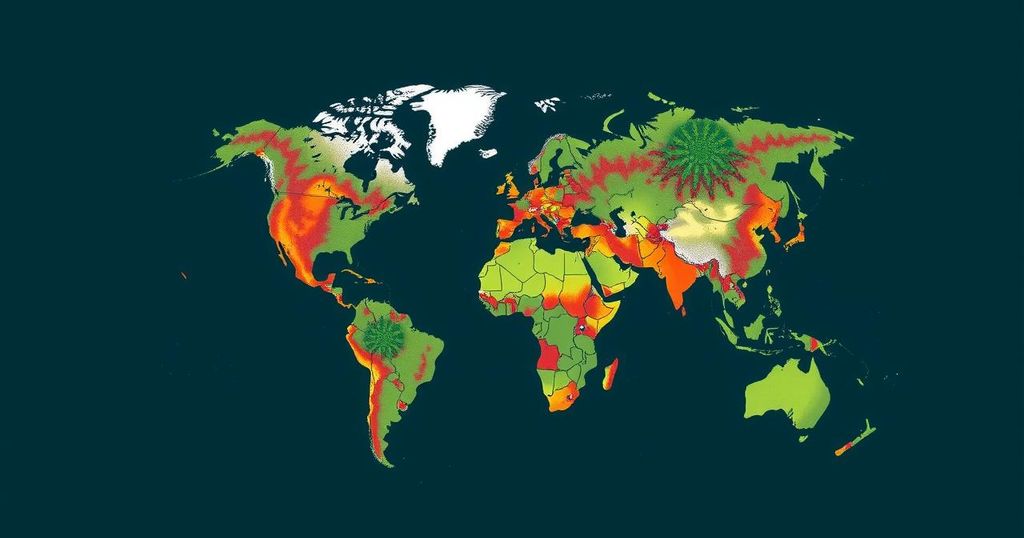Global Commitment to Climate Action Diminishes Amid 2024 Elections
The 2024 election year is witnessing a concerning decline in global commitment to climate action, even as climate crises intensify worldwide. Major electoral victories for populist leaders like Donald Trump, who dismiss climate change, reflect this troubling trend. With economic issues overshadowing environmental priorities, the need for urgent climate action is increasingly critical amid an increasingly complex political landscape.
The year 2024, dubbed by the United Nations as “the biggest election year in human history,” has revealed a disturbing trend: numerous countries are experiencing a decline in their commitment to addressing the climate crisis, despite facing severe weather events and rising temperatures. Recent electoral victories of populist leaders, such as Donald Trump in the United States, who dismisses climate change as a falsehood, highlight this troubling diversion of priorities. Even as climate events occur with greater frequency, public focus on climate action has waned, influenced by the aftermath of global conflicts and economic issues like inflation.
Catherine Fieschi, an expert on European politics, observed, “It’s quite clear that in most advanced economies the big loser of the elections has been climate.” She noted that, while climate issues once held paramount importance, they have now taken a backseat, overtaken by concerns around economic stability and energy costs. This shift is evident as countries engage in political discourse that increasingly emphasizes energy affordability rather than environmental protection.
This year has seen record-breaking global temperatures and devastating climate events, yet climate has notably receded as a focal point in electoral campaigns worldwide, apart from specific cases like India where farmer protests influenced political outcomes. In Europe, right-wing parties that challenged the necessity of climate policies gained traction during the EU elections. Simultaneously, in the United States, Trump secured a victory against Kamala Harris, pledging to dismantle existing environmental regulations.
While some nations, such as the UK, demonstrated progress toward green energy initiatives, the overall landscape reflects an alarming stagnation in global efforts to combat climate change, as scientists warn of the potential breach of critical climate targets. Political scientist Jan-Werner Müller cautioned against rushing to associate all Trump supporters with extremism, while pointing to concerning trends among center-right leaders, who might be inclined to downplay climate issues to appease a broader electorate.
The recent Cop29 climate summit in Azerbaijan highlighted these challenges, as many global leaders were notably absent, and discussions surrounding fossil fuels remained contentious. Activists expressed frustration over the lack of substantial actions on emission reductions and financial commitments for vulnerable nations, with one leader lamenting, “What on earth are we doing in this gathering?”
Despite some advancements in renewable energy, the current trajectory is disheartening, particularly in light of a potential Trump presidency, underscoring the urgency of climate action as time dwindles.
The global commitment to tackling climate change faces a significant challenge in 2024, marked as a pivotal election year with widespread populism and political shifts. The trends emerging from electoral outcomes indicate a worrying decline in climate priorities amid escalating global temperatures and environmental disasters. Historical context is crucial, as the recent rise of leaders skeptical of climate science has instigated a shift in the political landscape, overshadowing the urgency of climate action that was once a focal point in international discussions and policy-making after the global mobilization led by youth activists like Greta Thunberg.
In conclusion, year 2024 signifies a critical juncture for climate action amidst a backdrop of significant elections, with many countries witnessing a reduction in commitment to climate initiatives. The rise of populist leaders, who espouse skepticism toward climate science, alongside evolving public priorities concentrated on economic concerns, illustrates a pivotal challenge that could hinder global efforts against climate change. Activation of robust climate policies is essential as the planet continues to face unprecedented environmental crises, and time for meaningful action is rapidly dwindling.
Original Source: www.theguardian.com




Post Comment